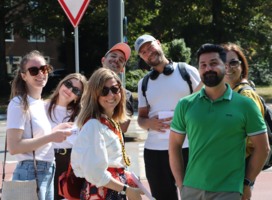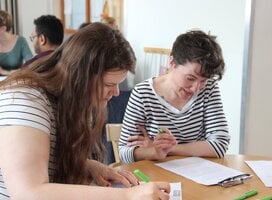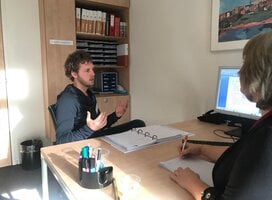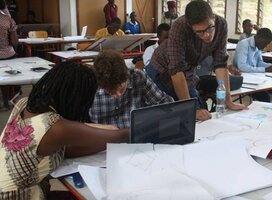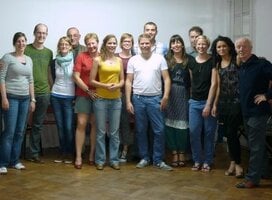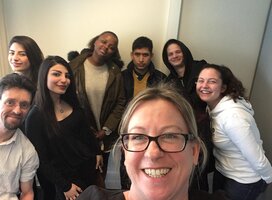Dutch Language Schools in the Netherlands
Dutch is spoken throughout all of the Netherlands, but most people speak English as well, which makes it a great place to start learning this unique language. Perhaps you are interested in learning Dutch in the Netherlands because you have family ties, maybe your family has moved there for work, or you just love the culture and want to fully embrace it.
No matter the reason, you won't regret any amount of time spent in this center of innovation, cultural diversity, and artistic skill. The country is known for being home to Vincent van Gogh and Rembrandt, for its seafood and cheese, and its fascinating history. Today, the Netherlands is also known for being bike friendly too.
The Netherlands has twenty national parks that come alive in spring. These breathtaking landscapes are home to picturesque windmill farms and fields of flowers. If you only have one week, it's worth it; but take as much time as you can to explore the land, the language, and the delightful people of the Netherlands.
Course Types
Dutch language course options are varied enough to fit most learning styles, budgets, and time constraints. Some Dutch language learning schools offer weekly evening classes for those who have work or other classes during the day. However, the more popular option for international students are immersion courses.
Immersion courses at language learning schools usually last from one to four weeks. You'll meet students from other countries who are at your experience level. Courses like these are great no matter how much or little Dutch you know. You can expect 20 to 25 hours of instruction time per week. Some programs offer student accommodation and others place you with host families.
The other option for study, if you are living with a host family, is to learn from a private tutor. In this way, you get personalized instruction and attention and your host family will always be there to help you practice your Dutch. The tutor will either be a member of the family you stay with or you'll meet at another location.
It's also possible to study Dutch at a university. If you plan to get your entire college degree in the Netherlands, you can enroll directly as an international student to your chosen school. If you prefer a shorter stay, you can go through a third party provider and study abroad for a summer, semester, or year.
Why Learn Dutch Abroad
While online language programs make it possible to study any language from any location, it's no substitute for being surrounded by native speakers, and perhaps more importantly, by their culture.
Because nearly everyone in the Netherlands speaks both Dutch and English, it is possible to get around without learning the Dutch language. However, being immersed in the culture supplies the necessary motivation for language acquisition that online learning cannot.
Qualifications
There are Dutch language learning options available for students of all ages and experience levels. Some programs have a minimum age of 16, but there's no maximum age limit. Most will require a firm command of the English language and higher level courses will require some evidence of Dutch language skills.
Popular Locations to Learn Dutch in the Netherlands
As Dutch is spoken throughout the Netherlands, you will have plenty of cities to choose from. While many of the cultural distinctions stay the same from place to place, each offers something a little different. There are pros and cons to consider for each location, depending on your goals.
Amsterdam has the largest population and is the most popular tourist destination in the Netherlands. It also has the most options for studying Dutch. If you choose to learn Dutch in Amsterdam you will have access to world famous attractions, museums, and historical sites. It will be more convenient to travel to other countries, and because Amsterdam is centrally located, it will be easier to take a train to other cities in the Netherlands. You'll experience canals, festivals, and parades within a culturally diverse and lively city.
If your goal is to save money while still experiencing Dutch culture firsthand, you might consider a smaller or less touristy location. The population in Rotterdam is not much smaller than Amsterdam. The youthful city is known for its architecture and its designers.
Vught, which is located right near a medieval city, is another option for studying Dutch. It was voted best place to live in Amsterdam. With such close proximity to Belgium, it's a great choice if you are interested in weekend visits to another country.
Eindhoven is a university town with plenty of dining and entertainment options for a fun night out. Finally, Drenthe is a good choice if you enjoy a serene setting and outdoor activities and sports.
Choosing a Dutch Learning Program in the Netherlands
Each Dutch Language Learning Program will offer its own unique benefits. The organizations that facilitate your time abroad make each of these opportunities sound incredible, so it can be difficult to choose the one that's really right for you. Here are some questions you can ask yourself to help narrow the options.
What's included in the cost? Some programs list one price, and that price includes everything (flights, accommodation, meals, tuition, etc.). This is most common if you choose to learn Dutch through a study abroad program.
Most language learning schools and tutoring options advertise a price that includes tuition and accommodation, but not flights or meals. You might have your own bedroom, bathroom, or even a bike to get to and from classes or around town. If the housing situation is not fully explained on the website, double-check with a real person to make sure you aren't getting into a situation where you'll be uncomfortable.
How do I learn best? If you know you learn better through one-on-one instruction, it might be worth it to you to pay extra for a private tutor. But if group work motivates you more, you'll be able to save money by taking classes with other students.
How important is location? You spend less by studying Dutch in locations other than Amsterdam. However, if living in Amsterdam for a while is your main goal, you shouldn't give that up lightly.
If your schedule allows it, you might consider doing two successive short language learning programs in different locations to get a more well-rounded experience of the Netherlands, and possibly save a little money too.
What are my time constraints? If you don't have time to do two programs, but need to get a firm command of the Dutch language as quickly as possible, private tutoring or other short-term intensive programs are probably your best bet.
Cultural Immersion in the Netherlands
The Dutch culture is a beautiful one to be immersed in. As with any culture, the longer you are able to stay, the better you will understand the similarities and differences. However, even a short stay will provide a snapshot of the country and its people.
The Dutch have their own version of southern hospitality, called gezellig. Their upbeat and quirky attitudes will not go unnoticed. They are proud of their food, art, and innovations. Do your best to spend time in both the big cities and the smaller towns for the full effect.
Of course, there are the main attractions like the Anne Frank House and the Van Gogh Museum, and the expected windmill and tulip sightings. Outside of Amsterdam, you can explore medieval cities, visit small local restaurants with live music, and go on food tours.
Average Dutch Language School Tuition in the Netherlands
The cost of attending a Dutch language school in the Netherlands will vary depending on where you go and what instruction type you choose. Living anywhere other than Amsterdam and studying in a group will be much cheaper than hiring a private tutor in Amsterdam.
If you study with a group in smaller towns you can expect to spend around €590-€680 for two weeks. That breaks down to €295-€340 per week or at least $350 depending on the current rate of exchange.
If you stay with a host family and study from a private tutor in Amsterdam or its suburbs the cost will be approximately €1365 for one week, or $1630. A two-week immersion camp costs around €1090, which comes to €545 for one week, or $650.
Scholarships for Learning Dutch in the Netherlands
The most likely option for getting a scholarship to learn Dutch in the Netherlands is to study at a university. That would include both study abroad and directly enrolling at a school in the Netherlands.
Your home university might have funds available for study abroad. The Netherlands also offers several options for international students who wish to pursue a degree through research or study. If there's nothing that fits your qualifications, the Fullbright program or other grants might be worth considering.
Cost of Living in the Netherlands
If you've lived or traveled in other areas of Western Europe, you won't be shocked by the cost of living in the Netherlands. Dinner can range from €10 to €30 depending on the quality of the restaurant. Drinks are €2-€3 each. Public transport within the city is €1-€3 and farther train trips are €10 to €25 one-way.
If you are staying with a host family, some or all meals may be included in the cost. If you're in student housing meal plans may be available at approximately €7 per meal. You'll probably have access to a kitchen, which may be the cheapest option, especially if you live near an Aldi or Lidl.
Visas & Other Relevant Information
For a short stay, anything less than 3 months, a visa is not required. If you are going to be studying in the Netherlands for longer than three months, you will need proof of enrollment from the school or university.
